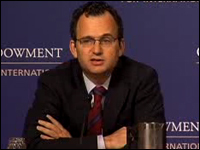Registration
You will receive an email confirming your registration.
In a region struck by instability, indirect talks between Syria and Israel - two key players in the Middle East - offer a hopeful window of opportunity for a calming peace deal. Paul Salem, director of the Carnegie Middle East Center in Beirut, and Daniel Levy, director of the Middle East Initiative at the New America Foundation, discussed the two countries’ intentions and attitudes towards reaching a peace deal, and the United States’ crucial mediating role in the process. Marina Ottaway, Director of the Middle East program, moderated the discussion.
Negotiating Postures
Paul Salem argued that Israel and Syria can be serious about a land-for-peace deal.
Both states currently have three different options to pursue with respect to a peace agreement. Syria’s first option is a hard line approach, where it will use negotiations only to break its international isolation. The second is a medium option where stabilization of relationships is reached, but no peace is achieved. The last is to pursue negotiations to achieve the return of the Golan Heights in exchange for a peace treaty with Israel. Israel also has a hard-line option where it can entangle Syria in peace talks for tactical purposes. Israel can also settle for the middle option of a stable status quo, or pursue serious peace negotiations.
Benefits of a Deal
Both states realize the potential value of a land-for-peace deal. For Syria, a deal would enhance regime legitimacy, break its international isolation, and potentially attract trade and investment to improve its economic situation. For Israel, normalizing relations with the last major hostile neighboring Arab state would greatly improve security, and could also push Lebanon to consider peace with Israel, while weakening Hezbollah’s role in the Arab-Israeli conflict and Iran’s influence. The U.S. administration should use a combination of sticks and carrots, and diplomacy.
Daniel Levy stated there is consensus in the Israeli security establishment on the need for negotiations with Syria. Israel is also worried about possible instability in Egypt and the effects on its security. On the other hand, a land-for-peace deal appears to be harder to sell to the Israeli public, which has become used to considering the Golan as part of its national map. Although there is space for other mediators to play a role in the peace negotiations, the U.S. needs to be the chief moderating force, and has compelling regional reasons to remain so. The process of negotiations would be positive for Syria regardless of the outcomes.
Questions & Answers
In the question and answer session both speakers further addressed the effects of a peace deal on the region, and stressed that a deal should not be at the expense of Lebanon or the Hariri tribunal.
